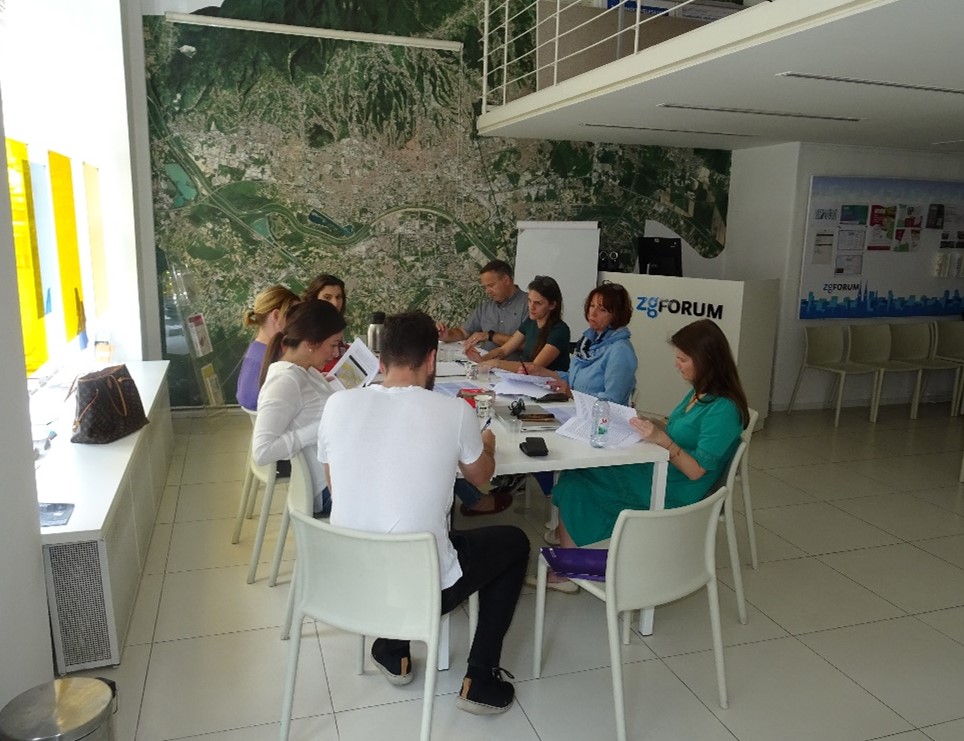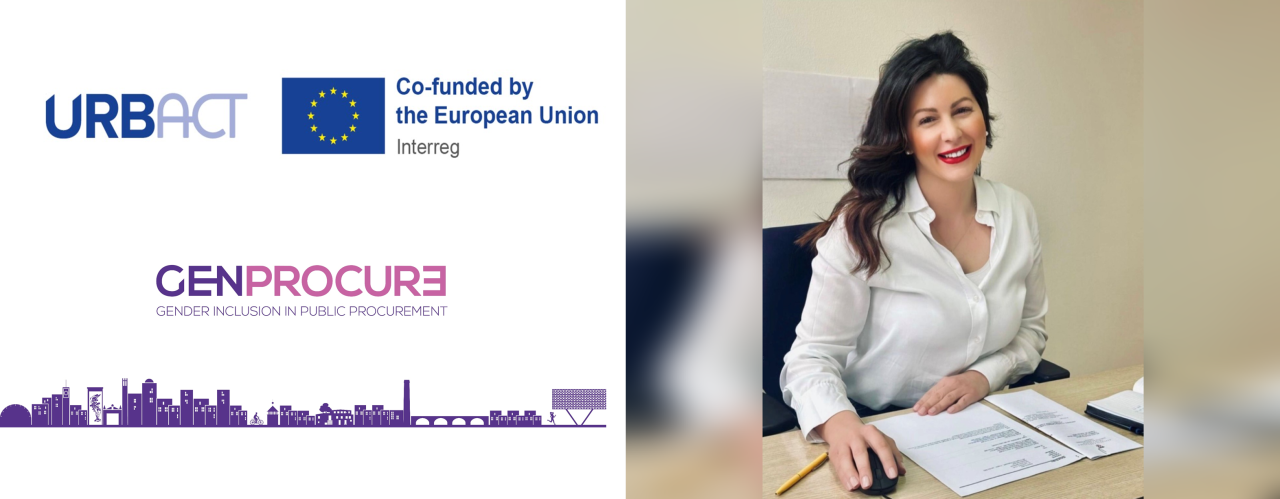1. The City of Zagreb has so far participated as a partner in three URBACT networks (URBAN REGENERATION MIX, SmartImpact, and Resourceful Cities), and you are currently partners in the GenProcure network - what is the theme of the network and why did you choose this particular theme?
The theme of the GenProcure network focuses on gender equality in public procurement. This approach encompasses promoting equality through procurement processes in the public sector, with a special emphasis on the interests and needs of both men and women, thereby contributing to the reduction of gender inequalities. Our project partner approached us with the idea of a joint project proposal and a request for collaboration. We considered this an excellent opportunity to expand knowledge about the URBACT program as well as to strengthen our network of international project partners.
2. Public procurement ensures the proper use of public funds in transactions between the public and private sectors, thus having an important economic and economic function. What are the benefits of applying gender equality principles in public procurement?
Ensuring equal opportunities for all participants in public procurement, regardless of gender, makes this process fairer and more transparent. Diversity within teams involved in public procurement can result in more innovative solutions and improve the quality of products and services. Including women in this sector not only encourages greater economic activity but also contributes to strengthening their role in the economy. Public procurement can serve as a powerful instrument for increasing women's employment, especially those facing challenges in the labor market. By applying gender equality principles, gender discrimination is reduced and equal opportunities for all are promoted. Adhering to these principles also ensures compliance with national legislation and international standards, thus reducing potential legal risks.
3. GenProcure is a planning network in which each partner will have developed an Integrated Action Plan (IAP) by the end of the project. Can you reveal the main goals of the IAP and how you plan to improve local public procurement? Given that public procurement is regulated by numerous legal and sub-legal acts, does this create obstacles or facilitate the action planning process? Do you think the existing Public Procurement Act should be changed?
The goal of the Integrated Action Plan is to emphasize increasing efficiency through reducing economic disparities between male and female entrepreneurs, achieving greater diversity along with improved quality and effectiveness of public services and goods, and social equality where economic opportunities are evenly distributed.
Amendments to the Public Procurement Act should obligate contracting authorities to integrate social criteria into public procurement processes. Currently, their inclusion is optional, which complicates the application of social and societal criteria when selecting offers. Therefore, it is crucial to create a framework that will encourage and facilitate the use of these criteria, contributing to a more sustainable and equitable public procurement system.
4. A distinctive feature of URBACT is the implementation of pilot actions that allow testing potential solutions before their inclusion in Integrated Action Plans. Have you already started implementing pilot actions, and what results has the testing produced?
So far, we have carried out three test actions aimed at improving public procurement. The first action involved internal training for employees of the City of Zagreb on gender equality, with the aim of integrating this important aspect into public procurement processes. We gathered representatives from city offices dealing with human rights, social inclusion, as well as those receiving citizen initiatives and overseeing all work in the City of Zagreb. The main challenge was to define the necessary criteria related to gender equality, social aspects, and green policy, and to adapt them to the specificities of the procurement process, while considering the needs of citizens.
The second test action focused on integrating gender equality, as well as social and green criteria into public procurement. During the evaluation, we did not receive any offers, which required us to adjust the criteria according to current market possibilities. This test action is still ongoing, and we will strive to continue it even after the project ends.
The third test action involved the development of a public procurement application, aimed at improving the procurement process through feedback from suppliers. The key challenge in this phase is to simplify complex procedures so that the application is useful and accessible to everyone. Testing of the application is still ongoing, and our goal is to ensure that the needs of all participants in the public procurement process are met.
5. Participation in URBACT networks allows cities to strengthen international cooperation. What does this cooperation look like in practice, and what would you highlight as key challenges and advantages of such an approach? Have you identified any particularly interesting practices or policies related to public procurement and gender equality from other cities in the network?
International cooperation in practice occurs through regular meetings held every few months. These international gatherings involve members of the ULG group and experts from URBACT, and parallel online trainings related to specific methodologies that are crucial for developing the Integrated Action Plan are organized. A major advantage of this program lies in the availability of all important information about projects being implemented within URBACT via an online platform.
One of the key aspects of URBACT is networking among partner cities along with training of local stakeholders. These trainings not only empower the skills and knowledge of local stakeholders but also enable them to successfully develop activities focused on sustainability and innovation, along with necessary financial support. However, one of the challenges of participating in the URBACT program is undoubtedly the need for long-term commitment from local stakeholders and the sustainability of achieved results.
Sweden stands out in this context as an example of good practice. During our visit to the partner city of Umeå, we had the opportunity to observe numerous interesting initiatives focused on the safety of women in public transportation, as well as examples of the design and construction of public underpasses, which are conceived to make women feel safe. Their attention to housing for socially vulnerable residents also reflects a high level of social awareness. The Swedish approach emphasizes practical solutions that respond to the real needs of the community, contributing to the quality of life for citizens.
6. URBACT is based on a participatory and integrated approach, so the involved cities establish a URBACT Local Group (ULG) to ensure the inclusion of the local community in the process of creating the IAP. Who are the members of your ULG, how does collaboration take place, and how has the engagement of local stakeholders improved the action planning process?
We established a URBACT Local Group (ULG) according to the guidelines of the URBACT program, but our true goal was much broader. We wanted to go beyond regulations and transform our initiative into an active community dedicated to implementation, monitoring, and education with the aim of achieving true equality.
Members of the ULG group within the GenProcure project come from the public and private sectors, various civil society organizations, and especially from the academic community. Logically, there are the most members from the academic community because if universities want to apply for EU tenders, they need to show how they care about gender equality and demonstrate the ways they are working on it. Members of our ULG group possess applicable and practical knowledge that can significantly contribute to improving the living conditions of specific target groups in Zagreb. This knowledge may seem simple at first glance, but it brings about significant changes.
For example, in the city of Umeå in Sweden, we observed how seemingly simple adjustments can significantly enhance the quality of life for citizens. Although these insights initially seemed distant to us, through our URBACT Local Group, we gained valuable insights on how to improve various aspects of life in our city.

7. Based on your experience participating in the GenProcure network, would you recommend other cities participate in URBACT? What distinguishes URBACT from other programs?
Absolutely! My experience has been extremely positive. At every international meeting, each partner city presents their solutions that we may not have considered before. After each meeting, we always return to our work environment enriched with new ideas. Generally, partner cities face the same challenges as the City of Zagreb. Being familiar with already implemented solutions is extremely useful because otherwise, going through all those lessons firsthand would take much more time.
Compared to other programs, URBACT stands out due to its exceptionally engaged work but in a pleasant atmosphere with a strong focus on problems. This can sometimes be challenging as it requires significant coordination – from collaboration within the project team, through the URBACT Local Group, to partner cities and leading experts.
Additionally, a significant advantage is the online thematic lectures that allow us to expand our knowledge, as well as various trainings within URBACT. The program offers numerous events that support the development of our activities, and there are also online materials and printed manuals that guide us through every step of the project.
8. You have less than a year left to implement project activities. What activities do you still plan to carry out by the end of the project?
By the end of the year, that is, by the conclusion of our project, we plan to initiate several new procurement procedures in which the principles of gender equality and/or social criteria supporting that principle will be used as conditions and/or criteria for selecting offers.
We will hold two international meetings with our project partners and complete the Integrated Action Plan. We will mark the project's conclusion with a final meeting of partners and a closing conference to be held in Zagreb.
We are very pleased to have the honor of hosting this event, but we are aware that we face a significant challenge in organizing it, as our project partners have set very high standards. In the end, we hope to continue collaborating with the same project partners through new projects.
Link to the original interview from Lucija Jusup, NUP Hrvatska:
Edited by: Edgar Azevedo, GenProcure Lead Partner

